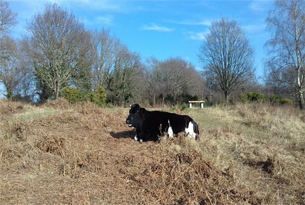Grazing
Using grazing livestock helps manage our fragile and special habitats
Why do natural areas need to be managed?
Some of our habitats have been designated Sites of Special Scientific Interest, which means they are protected. Using grazing to manage these areas helps maintain fragile habitats.
Without management, some plants and animals that are not natural to this area could become established and damage local wildlife and habitats.

We manage several local nature reserves that have fragile and special habitats.
Using livestock grazing to manage these areas is an effective and environmentally friendly way to look after natural habitats, the benefits include:
- Stopping unwanted scrub and tree growth
- Allowing nature to manage itself
- Providing a much wider range of vegetation types
- Helping wildlife
Find out more
Working together to protect and enhance the Dorset heathlands
Since September 2005, Bournemouth Borough Council is one of the various Local Authorities (Poole, Bournemouth, East Dorset, Christchurch, Dorset County Council), nature conservation NGOs (Non-Government Organisations - RSPB, Dorset Wildlife Trust and Amphibian and Reptile Conservation (ARC)) and Natural England who are working together to protect and enhance the Dorset heathlands.

The aim is to address management problems, particularly securing grazing, on Dorset’s urban heaths as part of the Urban Heaths Grazing Partnership.
What else benefits from the cattle grazing?
Our rare breed of cattle are important members of the nature reserve management team.
The way cattle graze, by grasping tufts of grass with their tongue, creates a grassland mosaic of short turf and patches of taller grass. This provides ideal cover for birds, insects and small mammals, such as mice and voles.

Without cattle our wild flower meadows would be a tangle of long grass, brambles and bushes.
Our cattle
We have around 60 cattle and ten British feral goats (these live on the cliffs at Boscombe). The breeds of cattle we have include:
Belted Galloways

British Whites

and Shetland.

We have chosen breeds that are known for having a calm nature around people and other animals. If you visit one of our grazing sites, please help our animals by not frightening them and follow these rules:
- Please keep your dogs under close control
- Please close gates behind you
- If you see anything that worries you, for example you think one of our grazing animals is ill or injured, please tell the Rangers for that area straight away.
Get in touch to find out more, or come into see us at Kingfisher Barn.